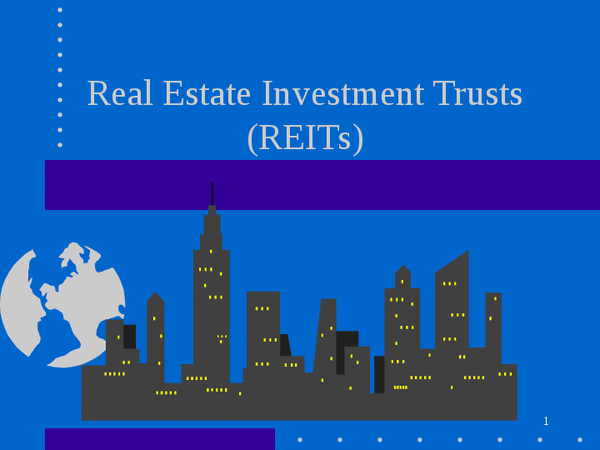What is a REIT (Real Estate Investment Trust)
Post on: 19 Июнь, 2015 No Comment

Comments ( )
When it comes to real estate investing, not many people can follow in the footsteps of Sam Zell and Donald Trump.
Be it simple genetics or a lack of savvy, most investors just don’t have the time, money, or knowledge it takes to be among the best in the real estate game. And make no mistake; without any one of the three of those things, real estate investing can be feast or famine.
As we have seen, the bursting of the housing bubble has bankrupted enough real estate geniuses to nearly topple the entire system.
The good news is there is a type of investment that can put you into the real estate arena without buying a fixer-upper or searching for decent tenants.
It’s called a real estate investment trust, or REIT for short.
A REIT is a company that owns and manages income-producing real estate.
REITs were created by an act of Congress in 1960 to enable large and small investors to enjoy the rental income from commercial property.
REITs are governed by many regulations, the most important being that they must distribute at least 90% of their taxable income to shareholders each year as dividends. Thats why theyre so popular with investors seeking steady income.
All REITs share the following requirements to qualify. By law they must:
Be structured as a corporation, business trust, or similar association
Be managed by a board of directors or trustees
Offer fully transferable shares
Have at least 100 shareholders
Pay dividends of at least 90% of the REIT’s taxable income (most REITs actually pay out nearly 100%)
Have no more than 50% of their shares held by five or fewer individuals during the last half of each taxable year
Hold at least 75% of total investment assets in real estate
Have no more than 20% of their assets consist of stocks in taxable REIT subsidiaries
REITs specialize by property type. They invest in most major property types, with nearly two-thirds of investments being in offices, apartments, shopping centers, regional malls, industrial facilities, and even fast-food chains.
The rest is divided among hotels, self-storage facilities, health care properties like hospitals and nursing homes, and some specialty REITs that own anything from prisons and theaters to golf courses and timberlands.
Several popular REITs are Annaly Capital Management, American Capital Agency, and Two Harbors Investment.
Benefits of REITs include:
High Yields. For many investors, the main attraction of REITs is their dividend yields. The average long-term (15-year) dividend yield for REITs is about 8% well more than the yield of the S&P 500 Index. Also, REIT dividends are secured by stable rents from long-term leases, and many REIT managers employ conservative leverage on the balance sheet.
Simple Tax Treatment. Unlike most partnerships, tax issues for REIT investors are fairly straightforward. Each year, REITs send Form 1099-DIV to their shareholders, containing a breakdown of the dividend distributions. For tax purposes, dividends are allocated to ordinary income, capital gains, and return of capital. As REITs do not pay taxes at the corporate level, investors are taxed at their individual tax rate for the ordinary income portion of the dividend.
The portion of the dividend taxed as capital gains arises if the REIT sells assets. Return of capital or net distributions in excess of the REIT’s earnings and profits are not taxed as ordinary income, but instead applied to reduce the shareholder’s cost basis in the stock. When the shares are eventually sold, the difference between the share price and reduced tax basis is taxed as a capital gain.
Liquidity of REIT Shares. You can buy and sell REIT shares easily on a stock exchange. By contrast, buying and selling property directly involves higher expenses and requires a great deal of effort.
Diversification. Studies have shown that adding REITs to a diversified investment portfolio increases returns and reduces risk, since REITs have little correlation with the S&P 500.
So there you have it a quick and dirty introduction to REITs.
Related Articles on What is a REIT (Real Estate Investment Trust)?
Mall landlords performed well last year, but REITs recognize that some shopping centers aren’t worth holding on to.
The REIT market is on fire. And it’s easy to see why.
Wal-Mart banks $455 billion annually with unprecedented exponential growth each year. Experts predict shareholders to triple their returns in just five years.
Real Estate Links
The Rise of Chinese Investors in London
THIS is the New Hot Property Market
Hong Kong has long been on top in the luxury real estate market. Now, however, those investors are moving on and looking elsewhere
Investing in Costa Rican Real Estate
Waterfront Property for Less Than $100,000
Looking to retire overseas? Consider Costa Rica, where locals report the highest life satisfaction in the world and the second-highest average life expectancy in the Americas.
Related Articles on What is a REIT (Real Estate Investment Trust)?
Mall landlords performed well last year, but REITs recognize that some shopping centers aren’t worth holding on to.














